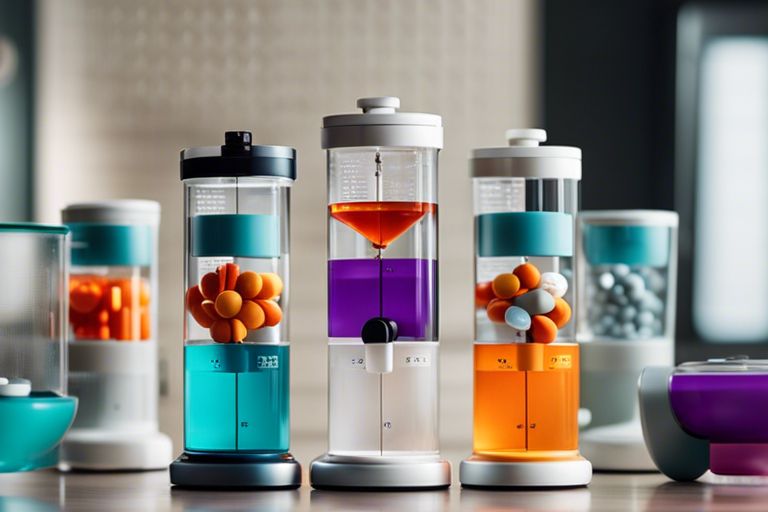
Medication reminders are crucial for maintaining a consistent treatment routine and avoiding harmful consequences of missed doses. According to a study published in BMJ Open, using MEDication reminder APPs to improve adherence can significantly enhance patient outcomes. By incorporating these reminders into daily life, individuals can stay on track with their medication schedules and ultimately improve their overall health. Find out more about the importance of medication reminders here.

Key Takeaways:
- Consistency is key: Medication reminders help individuals stay consistent with their treatment regimen, leading to improved adherence to medication schedules.
- Reduces the risk of missed doses: By setting up reminders, individuals are less likely to forget their medications, reducing the risk of missing important doses that can impact their health outcomes.
- Enhances overall health outcomes: Improved adherence through medication reminders can lead to better health outcomes, helping individuals manage their conditions more effectively and potentially reducing complications.


The Importance of Adherence
The Consequences of Non-Adherence
To truly understand the importance of medication adherence, we must first look at the consequences of non-adherence. Non-adherence to medication can result in a range of issues, from worsening health conditions to increased healthcare costs. Patients who do not follow their prescribed medication regimen may not achieve the desired therapeutic outcomes, putting their health at risk. Additionally, non-adherence can lead to more frequent hospitalizations and visits to the doctor, further impacting the patient’s well-being.
The Benefits of Improved Adherence
The benefits of improved medication adherence cannot be overstated. Improved adherence leads to better health outcomes and reduced healthcare costs in the long run. By following their medication regimen as prescribed, patients can manage their conditions effectively and avoid unnecessary complications. Moreover, improved adherence can enhance the overall quality of life for patients, allowing them to live more fully and actively.
Plus, adhering to medication schedules can decrease the likelihood of medication errors and prevent drug interactions that could be harmful to the patient. It is crucial for patients to understand the importance of adherence and the positive impact it can have on their well-being.
The Role of Medication Reminders
One of the key factors in medication adherence is remembering to take your medications as prescribed. This is where medication reminders play a crucial role in helping individuals stay on track with their treatment plans. By using different types of medication reminders, individuals can establish a routine and reduce the risk of missing doses, which can have serious consequences for their health.
Types of Medication Reminders
Using medication reminders can come in various forms, such as pill organizers, phone alarms, medication apps, and even smart devices like wearable technology. Each type of reminder serves a specific purpose and can be tailored to suit individual needs. By incorporating these reminders into daily life, individuals can create a system that works best for them and ensures they never miss a dose. Knowing the different types of medication reminders available can help individuals choose the right one for their unique situation.
| Pill Organizers | Phone Alarms |
| Medication Apps | Smart Devices |
| Calendar Alerts | Family Member Reminders |
| Email Notifications | Medication Dispensers |
| Automated Calls | Written Reminders |
How Reminders Work
For individuals managing chronic conditions, medication reminders play a critical role in ensuring they stay consistent with their treatment plans. These reminders help create a routine around medication-taking, reducing the likelihood of missing doses or taking them incorrectly. By setting up reminders through various means, individuals can build a habit of adherence that leads to better health outcomes in the long run.
Medication reminders work by providing cues to prompt individuals to take their medications at the designated time. These cues can be visual, auditory, or even tactile, depending on the type of reminder used. By incorporating reminders into their daily routine, individuals can improve their medication adherence and reduce the risks associated with missed doses.
Overcoming Barriers to Adherence
Forgetting to Take Medication
Take one of the most common barriers to medication adherence is forgetting to take medication on time. Life can get busy, and with numerous responsibilities, it’s easy for doses to slip your mind. Even those with the best intentions may struggle to remember to take their medication as prescribed.
Complexity of Medication Regimens
Forgetting to take medication can also be attributed to the complexity of medication regimens. Juggling multiple medications with different dosages and timings can be confusing and overwhelming. Patients may find it challenging to keep track of which pills to take when, leading to missed doses and decreased adherence.
Medication reminders can play a crucial role in simplifying the process of managing multiple medications. By receiving timely prompts and notifications, patients can stay organized and on track with their treatment plan.
Patient-Provider Communication
Any misunderstandings or lack of communication between patients and healthcare providers can also hinder medication adherence. Patients may not fully understand their treatment plan or have concerns about side effects, leading them to deviate from prescribed regimens.
To address this barrier, open and effective communication between patients and providers is crucial. Encouraging patients to ask questions, express concerns, and provide feedback can lead to a more collaborative approach to managing medications, ultimately improving adherence rates.
The Psychology of Reminders
Habit Formation and Cues
Not only do medication reminders serve as a practical tool for remembering to take medications, but they also tap into the psychology of habit formation. According to a study published in ScienceDirect, cues play a crucial role in habit formation. A method for designing context-aware reminders can leverage these cues to help individuals establish a consistent medication routine.
The Power of Routine
With our brains naturally gravitating towards routine and familiarity, incorporating medication reminders into daily habits can significantly improve adherence. The repetition of a reminder at the same time or in the same context each day can transform the act of taking medication into an ingrained behavior. By integrating reminders into existing routines, individuals can create a seamless way to ensure they never miss a dose.
The Power of Routine can influence behavior in profound ways. When reminders become intertwined with daily habits, individuals are more likely to adhere to their medication schedules consistently. Each successful completion of a task reinforced by a reminder strengthens the habit loop, making it easier to follow through on medication regimens. Establishing a reliable routine with the help of reminders can lead to long-term adherence and improved health outcomes.
Technology-Enabled Reminders
To Medication reminder applications to improve adherence in individuals with chronic conditions have shown promising results. These remind users to take their medications, track doses, and provide educational resources. Mobile apps and text messages are popular methods that leverage technology to enhance medication adherence.
Mobile Apps and Text Messages
Technology-enabled reminders through mobile apps and text messages offer convenience and accessibility. Individuals can set personalized reminders based on their medication schedule, helping them avoid missing doses. Moreover, these apps often come with additional features like medication tracking, refill reminders, and educational content to empower users in managing their health better.
Wearable Devices and Alarms
The use of wearable devices and alarms for medication reminders is gaining traction in the healthcare industry. These devices can be worn on the body or placed in living spaces to alert individuals when it’s time to take their medication. The benefit of wearable devices is the constant presence of the reminder, ensuring that users stay on track with their medication regimen.
Electronic Pill Boxes and Dispensers
Apps such as electronic pill boxes and dispensers provide a tangible and visual way to organize medications and receive timely reminders. These devices are particularly helpful for individuals with complex medication regimens or cognitive challenges. The convenience of having pre-filled compartments with scheduled alarms promotes adherence and reduces the risk of missed doses.
Customizing Reminders for Individual Needs
Personalized Messaging and Timing
Keep track of your medication schedule with personalized messaging and timing that caters to your unique needs. Medication reminders can be customized to include motivational messages or specific instructions that resonate with you, making the process more engaging and effective. By setting reminders at optimal times that align with your daily routine, you are more likely to remember to take your medications consistently.
Adapting to Changing Medication Regimens
Personalized medication reminders can adapt to changes in your medication regimen, ensuring that you stay on track even if adjustments are made. Whether it’s a dosage change, addition of a new medication, or switching to a different schedule, customizable reminders can be updated accordingly to reflect these modifications.
The flexibility of customized medication reminders is key to supporting individuals who may require frequent changes in their medication routines due to evolving health conditions or treatment plans.
Incorporating Caregiver Support
Medication reminders can also be customized to incorporate caregiver support for those who may need assistance with managing their medications. Caregivers can receive notifications to help remind their loved ones to take their medication on time, providing an added layer of support and accountability.
Customizing reminders to include caregiver involvement can help ensure that medication adherence is a team effort, promoting better health outcomes for the individual receiving care.
Conclusion
Considering all points discussed in the article “Why Use Medication Reminders for Improved Adherence?”, it is clear that medication reminders play a crucial role in enhancing medication adherence among individuals. These reminders help individuals stay on track with their treatment plans, ultimately leading to better health outcomes and improved quality of life. By incorporating medication reminders into daily routines, individuals can effectively manage their medications and reduce the risk of missed doses or incorrect usage, promoting overall well-being.
In short, the utilization of medication reminders is a simple yet effective way to ensure that individuals adhere to their prescribed medication regimens. With the advancement of technology, there are now various tools and apps available to cater to different preferences and lifestyles. By taking advantage of these reminders, individuals can better manage their health and journey towards improved adherence and better overall health.
FAQ
Q: Why is medication adherence important?
A: Medication adherence is crucial for managing chronic conditions, preventing complications, and improving overall health outcomes.
Q: What are medication reminders?
A: Medication reminders are tools or systems that help individuals remember to take their medications on time.
Q: How do medication reminders improve adherence?
A: Medication reminders provide cues and prompts that help individuals establish a routine and stay consistent with their medication schedule.
Q: What are the different types of medication reminders available?
A: Medication reminders can come in the form of pill organizers, alarms, mobile apps, text message alerts, and smart pill dispensers.
Q: How can medication reminders benefit patients?
A: Medication reminders can help patients stay organized, reduce the risk of missed doses, and ultimately lead to better health outcomes.
Q: Are there studies supporting the effectiveness of medication reminders?
A: Yes, several studies have shown that medication reminders significantly improve medication adherence rates among patients.
Q: How can healthcare providers encourage patients to use medication reminders?
A: Healthcare providers can educate patients about the benefits of medication reminders, recommend suitable reminder tools, and provide ongoing support and guidance.


No Comments